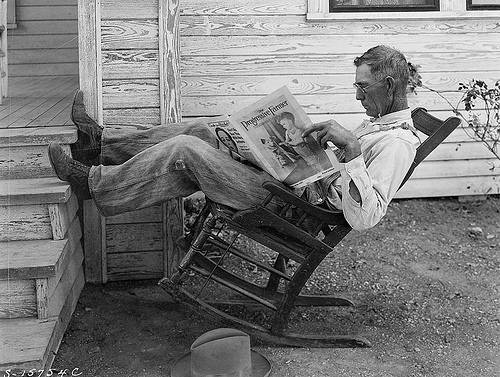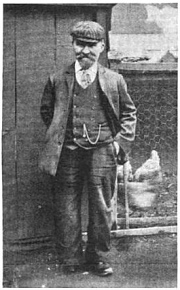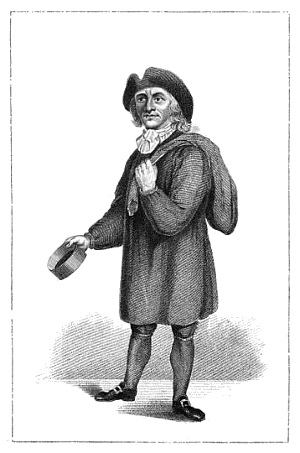
“Where the press is free, and every man able to read, all is safe.” — Thomas Jefferson

“Where the press is free, and every man able to read, all is safe.” — Thomas Jefferson
In 1875, the Associated Press reported a novel business enterprise being planned near Lacon, Ill. A prospectus summed it up:
Glorious Opportunity To Get Rich!!! — We are starting a cat ranch in Lacon with 100,000 cats. Each cat will average 12 kittens a year. The cat skins will sell for 30 cents each. One hundred men can skin 5,000 cats a day. We figure a daily net profit of over $10,000. Now what shall we feed the cats? We will start a rat farm next door with 1,000,000 rats. The rats breed 12 times faster than the cats. So we will have four rats to feed each day to each cat. Now what shall we feed the rats? We will feed the rats the carcasses of the cats after they have been skinned. Now Get This! We feed the rats to the cats and the cats to the rats and get the cat skins for nothing!
It was only a hoax dreamed up by local newsman Willis Powell, but, legitimized by AP’s coverage, the story bounced around the country for 65 years before the National Press Club finally debunked it in 1940. There’s a moral here somewhere.
Prove that the number of people who shake hands an odd number of times at the opera next Thursday will be even.
balatronic
adj. pertaining to buffoons

Events in the life of Welsh coal miner David Wilson, born 1846:
Seeing a pattern, he renounced for 28 years doing any work on Aug. 26, but in 1890 he forgot the date, went to work, and broke his left leg for the fourth time.
“The number of accidents the man has had is wonderful, but by far the most remarkable fact in connection with his history is their all happening on a certain day in the year,” wrote Walter Kruse in the Strand. “It is only explainable on the supposition that some natural law is at work, and that this law is in some way connected with the earth’s revolution around the sun, because the accidents always happened precisely when the earth reaches the same position in its orbit around the sun. It is very evident we have not arrived at the summit of our knowledge, and that there are causes and influences at work which are not noticed by the casual observer.”
When Billy Wilder visited Paris in the 1940s, his wife asked him to buy her a bidet.
After a few days he wired back:
UNABLE OBTAIN BIDET. SUGGEST HANDSTAND IN SHOWER.

Thomas Britton (1644-1714) gave the 17th century proof that a flower can bloom wherever it’s planted. Though a humble coal merchant, Britton so distinguished himself in chemistry, book collecting, and music that he attracted admirers among the high-born. And, wonderfully, when he converted the tiny loft over his coal repository into a concert hall, they attended a weekly series of chamber music concerts there.
“The ceiling of the room in which his concert was held was so low that a tall man could scarcely stand erect in it,” runs one account. “The staircase was outside the house, and could scarcely be ascended without crawling; yet ladies of the first rank in the kingdom forgot the difficulty with which they ascended the steps in the pleasure of Britton’s concert, which was attended by the most distinguished professors.”
The concerts came to be thought the best in London, attracting both wealthy music lovers and the most eminent musicians (including, by some accounts, Handel himself).
Throughout all this Britton continued to work in the coal trade and charged only the lowest subscription rates. “Britton was indeed so much distinguished that when passing along the streets in his blue linen frock, and with his sack of small-coal on his back, he was frequently accosted with such expressions as these: ‘There goes the famous small-coal man who is a lover of learning, a performer of music, and a companion for gentlemen.'”
Indeed, after a lifetime mixing with high and low, Britton died renowned for both humility and cultivation. The poet John Hughes wrote, “Let useless pomp behold, and blush to find / So low a station, such a liberal mind.”
Three men went into a diner, and each ordered a cup of coffee. The waitress brought the three cups of coffee and a dish with twelve lumps of sugar. Each man took an odd number of lumps of sugar, and when they had finished, there was no sugar left. How many lumps did each man take?
It requires only a few moments to recognize that the sum of three odd numbers must be odd itself. So there must be a trick somewhere, and there is.
The first man took one lump, the second man took one lump, and the third man took ten lumps. “Aha!” you will cry, “ten is not an odd number!” And then, we slyly inquire, “Do you know anyone who takes ten lumps of sugar in his coffee?”
— M.H. Greenblatt, Mathematical Entertainments, 1965

How lightly leaps the youthful chamois
From rock to rock and never misses!
I always get all cold and clamois
When near the edge of precipisses.
Confronted by some yawning chasm,
He bleats not for his sire or mamois
(That is, supposing that he has’m),
But yawns himself — the bold young lamois!
He is a thing of beauty always;
And when he dies, a gray old ramois,
Leaves us his horns to deck our hallways;
His skin cleans teaspoons, soiled or jamois.
I shouldn’t like to be a chamois,
However much I am his debtor.
I hate to run and jump; why, damois,
‘Most any job would suit me bebtor!
— Burges Johnson, Beastly Rhymes, 1906
The index for Paul Halmos’ 1942 textbook Finite-Dimensional Vector Spaces contains this entry:
Hochschild, G. P., 198
It appears on page 198 of the index. Hochschild is mentioned nowhere else in the book.
Keith Waterhouse asked, “Should not the Society of Indexers be known as Indexers, Society of, The?”